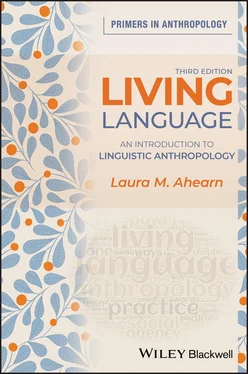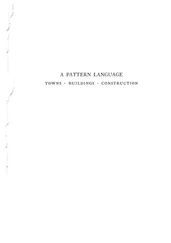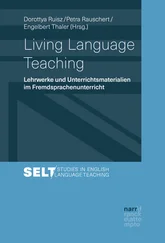What can such situations tell us about the ways in which language both shapes and is shaped by cultural values and socialpower?
How do dimensions of difference or inequality along lines such as gender, ethnicity, race, age, or wealth get created, reproduced, or challenged through language?
How can language illuminate the ways in which we are all the same by virtue of being human as well as the ways in which we are incredibly diverse linguistically and culturally?
How, if at all, do linguistic forms, such as the three different words in Nepali for “you” or the various slang words for “stoned,” influence people’s thought patterns or worldviews?
How might people’s ideas about language (for example, what “good” language is and who can speak it – in other words, their “language ideologies”) affect their perceptions of others as well as themselves?
How does the language used in public rituals and performances both differ from and resemble everyday, mundane conversations?
What methods of data collection and analysis can we use to determine the significance of events such as those described above?
The starting point in the search for answers to all of these questions within linguistic anthropology is this fundamental principle: language is inherently social. It is not just a means through which we act upon the social world; the use of language is itself a form of social action. Language is a cultural resource available for people to use (Duranti 1997:2). We do things with words, as the philosopher J.L. Austin (1962) reminded us decades ago. Even when we speak or write to ourselves, our very choices of words, as well as our underlying intentions and desires, are influenced by the social contexts in which we have seen, heard, or experienced those words, intentions, and desires before. Linguistic anthropologists therefore maintain that the essence of language cannot be understood without reference to the particular social contexts in which it is used. But those contexts do not stand apart from linguistic practices or somehow “contain” them, as a soup bowl would contain soup.1997:2). We do things with words, as the philosopher J.L. Austin (1962) reminded us decades ago. Even when we speak or write to ourselves, our very choices of words, as well as our underlying intentions and desires, are influenced by the social contexts in which we have seen, heard, or experienced those words, intentions, and desires before. Linguistic anthropologists therefore maintain that the essence of language cannot be understood without reference to the particular social contexts in which it is used. But those contexts do not stand apart from linguistic practices or somehow “contain” them, as a soup bowl would contain soup.1962) reminded us decades ago. Even when we speak or write to ourselves, our very choices of words, as well as our underlying intentions and desires, are influenced by the social contexts in which we have seen, heard, or experienced those words, intentions, and desires before. Linguistic anthropologists therefore maintain that the essence of language cannot be understood without reference to the particular social contexts in which it is used. But those contexts do not stand apart from linguistic practices or somehow “contain” them, as a soup bowl would contain soup.1997:2). We do things with words, as the philosopher J.L. Austin (1962) reminded us decades ago. Even when we speak or write to ourselves, our very choices of words, as well as our underlying intentions and desires, are influenced by the social contexts in which we have seen, heard, or experienced those words, intentions, and desires before. Linguistic anthropologists therefore maintain that the essence of language cannot be understood without reference to the particular social contexts in which it is used. But those contexts do not stand apart from linguistic practices or somehow “contain” them, as a soup bowl would contain soup. 4Rather, social contexts and linguistic practices mutually constitute each other. For this reason, language should be studied, Alessandro Duranti writes, “not only as a mode of thinking but, above all, as a cultural practice, that is, as a form of action that both presupposes and at the same time brings about ways of being in the world” (1997:1).
This approach to language differs from the popular view of language as an empty vehicle that conveys pre-existing meanings about the world. Language, according to this view, which is held by many members of the general public as well as many linguists and other scholars, is largely a set of labels that can be placed on preexisting concepts, objects, or relationships. In this mistaken way of thinking, language is defined as a conduit that merely conveys information without adding or changing anything of substance (Reddy 1979).
Within the field of linguistics, a similar approach to language is dominant: one in which language is reduced to a set of formal rules. Such reductionism extends back hundreds of years but was made the dominant approach of the field of linguistics by Ferdinand de Saussure, a famous Swiss linguist who lived a century ago. De Saussure maintained that it was not only possible but necessary to decontextualize the study of language: “A science which studies linguistic structure is not only able to dispense with other elements of language, but is possible only if those other elements are kept separate” (Saussure 1986[1916]:14).1986[1916]:14).1916]:14).1986[1916]:14). 5This perspective was reinforced by Noam Chomsky, an American linguist who revolutionized the field and has dominated it since the 1960s. Chomsky and his followers are interested in discovering Universal Grammar (UG), which they define as: “The basic design underlying the grammars of all human languages; [it] also refers to the circuitry in children’s brains that allows them to learn the grammar of their parents’ language” (Pinker 1994:483).
This is not to say that linguistic anthropologists are uninterested in grammar or believe that linguistic forms cannot be studied systematically – on the contrary, many build upon the “considerable progress in the understanding of formal properties of languages” made by scholars in the field of linguistics (Duranti 1997:7), but they ask very different kinds of questions that explore the intersections between grammar and social relations, politics, or emotion. Even linguistic anthropologists who value the work done by linguists believe that in order to acquire a comprehensive understanding of language, it must be studied in real-life contexts (cf. Hanks 1996). Grammar, according to linguistic anthropologists, is just one part of language’s “socially charged life” (Bakhtin 1981a: 293).1997:7), but they ask very different kinds of questions that explore the intersections between grammar and social relations, politics, or emotion. Even linguistic anthropologists who value the work done by linguists believe that in order to acquire a comprehensive understanding of language, it must be studied in real-life contexts (cf. Hanks 1996). Grammar, according to linguistic anthropologists, is just one part of language’s “socially charged life” (Bakhtin 1981a: 293).1996). Grammar, according to linguistic anthropologists, is just one part of language’s “socially charged life” (Bakhtin 1981a: 293).1997:7), but they ask very different kinds of questions that explore the intersections between grammar and social relations, politics, or emotion. Even linguistic anthropologists who value the work done by linguists believe that in order to acquire a comprehensive understanding of language, it must be studied in real-life contexts (cf. Hanks 1996). Grammar, according to linguistic anthropologists, is just one part of language’s “socially charged life” (Bakhtin 1981a: 293). 6
Читать дальше












